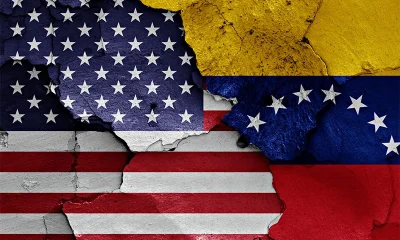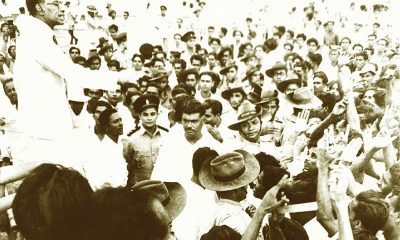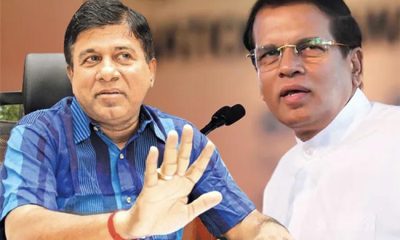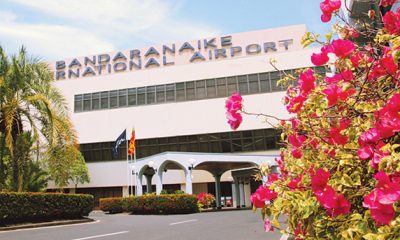Editorial
Sinners stoning sinners

Monday 27th November, 2023
The SJB has commenced collecting signatures for a public petition as part of a campaign to have those who are responsible for the current economic crisis stripped of their civic rights. Given public resentment, which is palpable, the SJB may be able to obtain hundreds of thousands of signatures for its petition, but the chances of its political venture yielding the desired results are remote; the Rajapaksas and their cronies are controlling Parliament. The SJB seems to be thinking that the ongoing campaign will help it gain some traction, but that move could turn out to be counterproductive because the Opposition politicians are not free from blame for the economic crisis.
The SLPP leaders are directly responsible for the country’s bankruptcy. The Mahinda Rajapaksa government indulged in wasteful expenditure, invested heavily in vanity projects, and did precious little to prevent the misappropriation of public funds. Corruption became the order of the day under that regime. The Gotabaya Rajapaksa administration totally mismanaged the economy, ruined the agricultural sector with its disastrous organic farming experiment and the ill-conceived blanket ban on agrochemicals, resorted to excessive money printing, did not make a serious effort to arrest the rapid depletion of foreign currency reserves and refused to seek international assistance to straighten up the economy until it was too late.
All SLPP MPs including those who have broken ranks with the government must be held accountable for the current economic crisis; even the dissidents among them supported the wrong policies of the Gotabaya administration until they fell from grace. Similarly, besides those who, the Supreme Court has said in a recent judgement, contributed to the current economic crisis, there are many others who made a tremendous contribution to the country’s bankruptcy, which was the culmination of a process that lasted for years under successive governments.
The SJB parliamentary group members who were in the Yahapalana government, which consisted of the UNP, the SLFP, the SLMC, etc., cannot absolve themselves of the blame for the current crisis. The UNP-led UNF administration did not care to reduce public debt. Instead, it slashed fuel prices and granted unusually high pay hikes to the public sector workers with the view to winning the 2015 general election. It neglected national security, and failed to prevent the Easter Sunday carnage, which entailed an enormous economic cost besides claiming more than 270 lives. The 2019 terror strikes, which crippled tourism, adversely impacted the country’s foreign exchange reserves.
The SLPP keeps saying that the Yahapalana government (2015-2019) worsened the national debt by borrowing USD 12.5 billion in sovereign bonds; nearly USD 7 billion were raised in just 15 months from early 2018 to mid-2019; out of that amount only USD 2 billion had been settled by the end of 2019. It will be interesting to see what the UNP, and its offshoot, the SJB, have got to say to this. Besides, the Yahapalana government allowed its cronies to enrich themselves at the expense of the economy. The Treasury bond scams are a case in point.
Above all, no less a person than Justice Minister Dr. Wijeyadasa Rajapakshe has revealed that the abolition of the Exchange Control Act No 24 of 1953 owing to the introduction of the Foreign Exchange Act No 12 of 2017 has stood unscrupulous exporters and other such elements in good stead. Most export proceeds are not repatriated, Minister Rajapakshe has said, adding that according to his information some exporters have hoarded about USD 56.5 billion offshore.
SJB MP Dr. Harsha de Silva has, in a recent television interview, sought to dispute Minister Rajapakshe’s claim, arguing that the new exchange control laws were intended to enable Sri Lankan businesses to expand abroad. But they certainly benefited racketeers more than anyone else. The new Foreign Exchange Act, inter alia, converted some criminal offences under the previous law into civil ones for the benefit of some crooks.
Thus, criminal cases that had been filed previously lapsed, and legal action was not instituted against the offenders concerned anew for obvious reasons; about 30 persons including the kith and kin of UNP and SLPP leaders are believed to have benefited from the new Act, which the SJB politicians voted for when they were in the Yahapalana government. The abolition of tough foreign exchange control laws contributed to the depletion of the country’s forex reserves and the current economic crisis.
The political parties that resorted to terrorism and/or supported terrorists are also guilty of having contributed to the ruination of the country’s economy. The economic cost of the JVP’s reign of terror in the late 1980s is hard to estimate due to the multifaceted nature of the repercussions of the mindless violence, which crippled the country. The TNA, created by the LTTE, functioned as the latter’s mouthpiece. It must also be held responsible for the damage the LTTE inflicted on the economy to the tune of billions of rupees. When the members of the current parliament accuse one another of having ruined the economy and call for punitive action, it is a case of sinners stoning sinners.
Editorial
A tale of two AGs and dirty politics

Friday 23rd January, 2026
The JVP-led NPP government has delayed the appointment of one AG—Auditor General—and is in overdrive to oust the other AG—Attorney General. Determined to parachute a ruling party crony into the post of Auditor General, allegedly in a bid to cover up corrupt deals on its watch, the government is believed to be biding its time until the reconstitution of the Constitutional Council to achieve its goal. The JVP/NPP is unashamedly using its propaganda brigade to carry out malicious social media attacks on Attorney General Parinda Ranasinghe Jr., PC, and having public protests held against him in a bid to hound him out of office.
It is said that a bad workman blames his tools. Similarly, an incompetent government quarrels with vital state institutions and public officials when it finds itself in trouble or fails to deliver. Inefficient, arrogant politicians also launch witch-hunts against key state officials who have the courage to stand up to political pressure, fiercely defend their independence and carry out their duties and functions without fear or favour. This, we have witnessed during successive governments. It is no surprise that the JVP-led forces are all out to oust AG Ranasinghe.
Not that the Attorney General’s Department has been truly independent and blameless; it has its fair share of servile officials who pander to the whims and fancies of ruling party politicians. This newspaper has been critical of the manner in which the AG’s Department handled some cases and helped open escape routes for politicians in power and their cronies. There is a huge backlog of cases due to inordinate delays on the part of the AG’s Department. These institutional deficiencies have been there for decades, and the incumbent AG alone cannot be blamed for them. There is a pressing need to straighten up the AG’s Department, which is in need of restructuring. Devolution is among the proposed solutions.
Government supporters have been holding protests, making unsubstantiated allegations against AG Ranasinghe and calling for his ouster. The tendency to hold kangaroo trials is in the JVP’s DNA. The JVP acted as the prosecutor, judge, jury and executioner in the late 1980s; it gunned down quite a few professionals including University Vice Chancellors and the heads of some other state institutions during its reign of terror. Now, it has apparently shifted from assassinations to character assassination, which can be a fate worse than death for most people. It used death-dealing sparrow units to eliminate its targets in the past. Today, it deploys its propaganda brigade to destroy its opponents politically.
If anyone believes that the AG is at fault, he or she can invoke the jurisdiction of either the Appeal Court or the Supreme Court to seek redress. If the government has irrefutable evidence to prove its supporters’ allegations against AG Ranasinghe, then Parliament can remove him after a probe. Dirty social media attacks and protests are certainly not the way.
In 2012-13, the JVP rightly defended the then Chief Justice Dr. Shirani Bandaranayake, when the Mahinda Rajapaksa government targeted her for political reasons and launched a vilification campaign against her before wrongfully impeaching her. Now, the JVP-led NPP government stands accused of trying to get rid of the state prosecutor.
The ongoing propaganda campaign against the AG could also be part of a strategy to paint a black picture of the AG’s Department, turn public opinion against it and prepare the ground for setting up the proposed Independent Prosecutor’s Office.
When the present-day government leaders promised ‘a system change’ during their election campaigns in 2024, it was thought that they were planning to change the systems for the better, but now one wonders whether they are bent on changing the existing systems for the worse by politicising them more.
The Bar Association of Sri Lanka deserves praise for having taken up the cudgels for beleaguered AG Ranasinghe. Let all right-thinking Sri Lankans, particularly the state sector professionals, be urged to follow suit.
Editorial
Conspiracy to subvert constitutional order

Thursday 22nd January, 2026
Former South Korean Prime Minister Han Duck-soo was yesterday sentenced to 23 years in prison for aiding and abetting the insurrection of the impeached former President Yoon Suk-yeol in 2024. The court confirmed that Yoon’s declaration of emergency martial law on 03 Dec., 2024 constituted an insurrection aimed at subverting the constitutional order. It pointed out that Han had helped provide a procedural facade of legitimacy for the illegal martial law by holding an unlawful Cabinet meeting.
That is how South Korea has dealt with those responsible for ‘an insurrection aimed at subverting the constitutional order”. But in Sri Lanka, no investigation has been launched into an illegal bid to appoint an interim President in violation of the Constitution and plunge the country into anarchy in 2022.
Irrefutable evidence has emerged that at the height of Aragalaya, on 13 July 2022, a foreign diplomat and a group of Sri Lankans consisting of religious leaders made a blatantly illegal bid to pressure the then Speaker Mahinda Yapa Abeywardena to take over the executive presidency in violation of the Constitution. Abeywardena himself said so in Parliament in early 2024. Following the defeat of a motion of no confidence against him, Abeywardena disclosed that after President Gotabaya Rajapaksa’s resignation in July 2022, he had come under immense external and internal pressure to take over as president. When he refused to comply, they had resorted to intimidatory tactics, he said, claiming that their intention was to create in Sri Lanka a situation similar to that in Libya. In other words, they sought to commit a serious crime against the State of Sri Lanka.
Professor Sunanda Maddumabandara, who was Senior Advisor (Media) to President Ranil Wickremesinghe, has disclosed in his book, ‘Aragalaye Balaya’ (‘Power of Aragalaya’), that on 13 July 2022, the then Indian High Commissioner to Sri Lanka Gopal Baglay visited Abeywardena and asked him to take over as president, but the latter said in no uncertain terms that he would never violate the Constitution. Abeywardena has revealed that soon after Baglay’s departure, a group of Sri Lankans led by Ven. Omalpe Sobitha, arrived at the Speaker’s official residence and asked him to take over the presidency. When he repeated what he had told the Indian envoy, Sobitha Thera sought to intimidate him into doing their bidding. The group consisted of another Buddhist monk, some Catholic priests, and a trade unionist, according to Abeywardena.
Prof. Maddumabandara has said Baglay told Abeywardena that if he took over the presidency, protests could be brought under control within 45 minutes. In a brief interview with our Associate Editor Shamindra Ferdinando, who reviewed Aragalaye Balaya, Prof. Maddumabandara has said only a person who had control over the protesters could give such an assurance. One may recall that it was the JVP that led the protesters who surrounded Parliament and tried to march on it in July 2022. Minister K. D. Lal Kantha himself has admitted that the JVP tried to lead the Aragalaya protesters to capture Parliament, but without success.
Interestingly, in early 2024, the Indian government, in what was described as a significant diplomatic outreach, invited JVP leader Anura Kumara Dissanayake to India, enabling the JVP to gain much-needed international legitimacy, which gave a fillip to Dissanayake’s presidential election campaign. By that time, the JVP had abandoned its rapid anti-Indian posturing, which underpinned its reign of terror in the late 1980s. Today, India has the JVP/NPP eating out of its hand, and the JVP-led government refuses to disclose the contents of several pacts, including one on defence, it has signed with India!
Prof. Maddumabandara has revealed that a contingent of the STF was deployed on the compound of the Speaker’s official residence unbeknownst to Abeywardena amidst attempts by violent mobs to capture Parliament. Who ordered the STF deployment?
The use of force, threat, conspiracy, or organised action to achieve unconstitutional change is a crime. But the 13 July 2022 conspiracy has gone uninvestigated. The JVP-NPP government will not have it probed for obvious reasons; it does not want to open a can of worms and antagonise India. But the need for a high-level investigation into the 13 July 2022 conspiracy to overthrow constitutional order cannot be overstated. Will the Opposition politicians who wrap themselves in the flag take up this issue?
Editorial
Rice and Rolls-Royce

Wednesday 21st January, 2026
A rice tycoon has become a clout chaser, posting ostentatiously on social media about his extravagance ad nauseam. He has been TikToking his newly acquired Rolls-Royce to boost his ego and online visibility. What he does with his own money should not be anyone else’s concern, one can argue. This argument is not without some merit. But the large-scale rice millers are making a vulgar display of their wealth in this manner while paddy cultivators, stuck neck-deep in debt, are mortgaging their household goods, jewellery and agricultural equipment to make ends meet, and the public is complaining of unconscionably high prices of rice. This shows that there is something terribly wrong with the mechanisms in place to safeguard the interests of rice growers and consumers; it has also given the lie to the big-time millers’ oft-repeated claim that they are just keeping their heads above water, and they are justified in increasing the prices of rice from time to time.
Powerful rice millers with huge slush funds are known to have politicians and political parties in their pocket. Successive governments have benefited from their largesse and protected their interests at the expense of the public. Those who elected Gotabaya Rajapaksa, a former military officer, as President, expected him to get tough with the unscrupulous millers notorious for their exploitative practices, but he lacked the courage to take them on. Instead of looking after the interests of the public, he ordered the Consumer Affairs Authority to stop searching for hoarded paddy in some wealthy millers’ sprawling warehouses, thus giving the rice tycoon fraternity carte blanche to manipulate paddy and rice markets. The predecessors of the failed Gotabaya regime did likewise. A wag says that when money talks even dyed-in-the-wool Marxists listen.
In 2024, the disillusioned electors overwhelmingly voted for the NPP led by the JVP, which claims to espouse Marxism, expecting the traders’ cartels, including that of millers to be tamed as a national priority. But the ‘Marxists’ signal left and turn right just like the tuk-tuks on Sri Lankan roads, and powerful millers continue to do as they please.
A few months into office, during a meeting with a group of powerful millers on rice shortages and high prices, President Anura Kumara Dissanayake created a bit of drama, banging as he did a clenched fist on his desk. Everybody thought he had put his foot down at last and was about to read the rice millers the riot act, asking them to comply with the legally set price ceiling for rice. But his theatrics ended in anticlimax; he increased the prices of rice by Rs. 10 a kilo much to the glee of the millers, who laughed all the way to the bank for the umpteenth time.
The politically connected millers are free to create shortages of rice and jack up prices, making the government import rice and saturate the market close to the commencement of paddy harvesting so that they can buy paddy at very low prices; thereafter they hoard paddy and increase the prices of rice. Huge stocks of imported rice, which does not suit the Sri Lankan palate, rot in government warehouses and are eventually sold as animal feed. Consumers and farmers are without anyone to turn to. The large-scale millers determine the prices of paddy and rice by keeping markets uncompetitive.
The self-proclaimed messiahs in the Opposition shed copious tears for paddy cultivators and rice consumers, vowing to safeguard their interests in case of being voted into power, but they also have a history of pandering to the whims and fancies of the wealthy millers, who generously bankroll election campaigns. The laws in place to regulate campaign finance lack strong teeth and politicians and their financiers drive a coach and horses through them.
One of the campaign promises of the incumbent government was to make Japanese hatchbacks freely available at Rs. 2 million each for the benefit of the public, but vehicle prices have gone into the stratosphere and even motorcycles and trishaws are beyond their reach. The ordinary people who are struggling to dull the pangs of hunger due to the high prices of rice have had to settle for watching the viral videos of the miller’s Rolls-Royce.
-

 Editorial6 days ago
Editorial6 days agoIllusory rule of law
-

 News7 days ago
News7 days agoUNDP’s assessment confirms widespread economic fallout from Cyclone Ditwah
-

 Editorial7 days ago
Editorial7 days agoCrime and cops
-

 Features6 days ago
Features6 days agoDaydreams on a winter’s day
-

 Features6 days ago
Features6 days agoSurprise move of both the Minister and myself from Agriculture to Education
-

 Features5 days ago
Features5 days agoExtended mind thesis:A Buddhist perspective
-

 Features6 days ago
Features6 days agoThe Story of Furniture in Sri Lanka
-

 Opinion4 days ago
Opinion4 days agoAmerican rulers’ hatred for Venezuela and its leaders

























